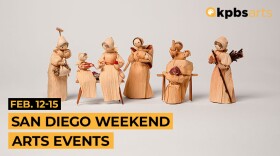Another big endorsement announcement in the race for mayor of San Diego came down on Friday.
Todd Gloria has been dubbed the iMayor — for his interim status in the mayor’s seat, and one supposes, for his fluency with social media. He laid out a progressive vision for San Diego in his State of the City speech and now he’s told us who he wants to implement it: fellow Democrat David Alvarez.
It’s a notable endorsement. Gloria is credited by movers and shakers from both sides of the aisle with steering the city back from the brink of a sexual harassment scandal and negative national attention.
Endorsements like the one from Gloria are coveted on the campaign trail. How effective they are is debatable.
What Does An Endorsement Really Mean?
The reasons are straightforward — endorsements simply create a sort of shorthand for voters.
Remember those once popular bracelets and bumper stickers sold at novelty stores and truck stops inscribed with the initials WWJD? The ones that stood for the phrase 'What Would Jesus Do'? Endorsements are kind of the WWJD for the political set, except with less Jesus.
There is another obvious reason for endorsements in a city with people who like to talk politics — every endorsement makes for a press release and the attendant press conference. It is a quick way to get a candidate’s name in print and picture flashed across the evening news.
It is as if the campaigns keep reaching out to us journalists with a message: “Hey, wondering how to cover my campaign today? Here is an easy headline for you! This public figure would vote for me, and we are going to stage an event to prove it!”
The Fight For Leftover Endorsements
So what are we to make of the endorsements falling into place in the newly re-ignited mayoral race?
There is a bit of both sides vying for the scraps left by the departure of one-time front-runner Nathan Fletcher.
The lifeguards, once standing in bro-like formation alongside Fletcher, are now paddling along behind Alvarez. When it came time for Faulconer to claim some of Fletcher’s booty, his team sent out an email entitled: “Bipartisan Group of Nathan Fletcher Supporters Endorse Kevin Faulconer For Mayor.”
That first press release did not include the individual names of those supporters, but the message coded in the keywords was clear enough — people who liked Fletcher are falling in line with Faulconer, from both sides of the aisle.
Faulconer has been using his endorsements to script a narrative of inclusion, trying to borrow the label of diversity once solidly affixed to his opponent. First came what a press release referred to as a “Latino Organization” to support him, next came a “Southeastern San Diego Coalition of Pastors.”

It is not hard to decode these announcements as nods to neighborhoods and diversity — as if to say Faulconer isn’t just the white — or white bread — candidate. He has Latinos and African Americans in his corner in a race in which diversity is seen as the other guy’s strength.
For his part, Alvarez, who in the first leg of the race cast himself as the progressive anti-establishment candidate, is also trying on the other shoe. He has assembled a business advisory group to signal he is open to business interests, a mantle perhaps easier associated with his opponent.

Faulconer, was outpacing his opponent slightly in the endorsement race, but the nod from Gloria helps to even them out.
Endorsements, in the end, form a political code, a cypher supposed to paint a picture of just who the candidates are and what kind of mayors they will be. But they use abbreviations of race, class, and political affiliation and the shorthand they provide often conceals more than it reveals — because no group is monolithic or all encompassing.







